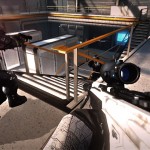 When Starbreeze handed The Darkness 2 off to Digitial Extremes, there was a worry that the Darkness series would be the one that suffered while whatever Starbreeze made would live up to their usual high standards. With The Darkness 2 being such a surprising and unqualified success, hopes were high that Starbreeze could create something as good as previous titles like Chronicles of Riddick or the original Darkness game. When they announced that they were remaking the classic but niche title Syndicate (but as an FPS), scepticism surfaced. Gamers are particularly resistant to classic titles being remade in different genres, particularly if the new genre is an FPS. Could Starbreeze elevate the crusty old Syndicate franchise into a cutting edge modern FPS while retaining the atmosphere and flavour of the original? The answer is no, but they have nonetheless managed to make a good game.
When Starbreeze handed The Darkness 2 off to Digitial Extremes, there was a worry that the Darkness series would be the one that suffered while whatever Starbreeze made would live up to their usual high standards. With The Darkness 2 being such a surprising and unqualified success, hopes were high that Starbreeze could create something as good as previous titles like Chronicles of Riddick or the original Darkness game. When they announced that they were remaking the classic but niche title Syndicate (but as an FPS), scepticism surfaced. Gamers are particularly resistant to classic titles being remade in different genres, particularly if the new genre is an FPS. Could Starbreeze elevate the crusty old Syndicate franchise into a cutting edge modern FPS while retaining the atmosphere and flavour of the original? The answer is no, but they have nonetheless managed to make a good game.
The first thing to know is that this game has very little of the feel or content of the original Syndicate games. In truth there probably aren’t that many of our readers that even played those games, but I did and I can tell you that this title has nothing to do with them. Bar the occasional nod to game items like the Persuadatron (and the titular Syndicates), this game has very little in common with the classics.
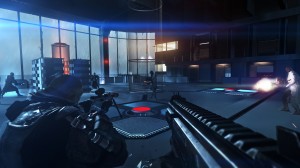 So what kind of game is this Syndicate? Well at first glance it seems to be uncomfortably similar to the newest Deus Ex game. Sharing the same cyber-punk themes and ultra-clean, neon bright, dystopian aesthetic, every frame taken from the game could be mistaken for a scene from Human Revolution. The one noticeable difference from an early point is the way that your augmented reality view of the game world frames and identifies every item you see from bookcases to lamps. This makes every item in the environment look like they can be interacted with, but once you realise that its just a visual contrivance it becomes a cool little touch that increases immersion in this strange but familiar game world. The opening moments of the game take place in a run down apartment block with rain coming through broken ceilings above, while huge floating neon billboards play adverts to a presumably disenfranchised populace. This is pure Blade Runner and as such pulled me into the game world immediately. The ultra modern environments of Human Revolution were a welcome break from sandy modern warfare levels or brown apocalyptic wastelands, and even if Syndicate look remarkably similar its still in a small group of games putting us in that type of world.
So what kind of game is this Syndicate? Well at first glance it seems to be uncomfortably similar to the newest Deus Ex game. Sharing the same cyber-punk themes and ultra-clean, neon bright, dystopian aesthetic, every frame taken from the game could be mistaken for a scene from Human Revolution. The one noticeable difference from an early point is the way that your augmented reality view of the game world frames and identifies every item you see from bookcases to lamps. This makes every item in the environment look like they can be interacted with, but once you realise that its just a visual contrivance it becomes a cool little touch that increases immersion in this strange but familiar game world. The opening moments of the game take place in a run down apartment block with rain coming through broken ceilings above, while huge floating neon billboards play adverts to a presumably disenfranchised populace. This is pure Blade Runner and as such pulled me into the game world immediately. The ultra modern environments of Human Revolution were a welcome break from sandy modern warfare levels or brown apocalyptic wastelands, and even if Syndicate look remarkably similar its still in a small group of games putting us in that type of world.
The themes of the game are very close to Human Revolution’s too. Trans-humanism is the primary defining characteristic of your own character, the hilariously names Miles Kilo (not a million miles from Sonic’s buddy, Miles Prower). The infighting between the games major corporations (or Syndicates) drive all the conflict in the game. You take on the role of an “Agent”; a trans-human with special powers available to you because of your control over the computer chips embedded in everyone heads including your own. The term “Agent” alludes to the Matrix, and when you face enemy Agents in the game there’s more than a little “Neo vs Smith” evoked in these fights.
 The story itself meanwhile…. well its great if you’re a fan of Brian Cox. The story hits every beat you would expect in a game where you work for a shady futuristic, amoral corporation, and the voice talent of Mr Cox is used throughout. Its not necessarily a criticism; he lends weight to the story and performs his lines with gravitas, even when the lines themselves are clunkers. His virtual in-game appearance isn’t too bad either. Every time he talks though, its clear he is used to smooth over the cracks in the dodgy dialogue and in truth they could have used a few more voice actors of his calibre to help him out.
The story itself meanwhile…. well its great if you’re a fan of Brian Cox. The story hits every beat you would expect in a game where you work for a shady futuristic, amoral corporation, and the voice talent of Mr Cox is used throughout. Its not necessarily a criticism; he lends weight to the story and performs his lines with gravitas, even when the lines themselves are clunkers. His virtual in-game appearance isn’t too bad either. Every time he talks though, its clear he is used to smooth over the cracks in the dodgy dialogue and in truth they could have used a few more voice actors of his calibre to help him out.
The gameplay itself is surprisingly basic. This is not a game about stealth at all, and that feels strange. As an Agent you would expect that you would have all sorts of options in combat scenarios from hacking robots to sneaking up and breaking necks. You don’t. Every combat scenario is faced as if you were the terminator, smashing through enemies and using a combination of powers and weapons to carve your way through opponents while building combos. In that respect its somewhat like Bulletstorm, rewarding you in a number of ways for recklessly attacking enemies.
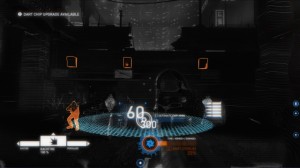 The first reward is adrenaline, which you use to fuel your powers, known as “breaches”. These breaches effectively involve you hacking computers in the world around you. In the case of the first two, persuade and suicide, you are hacking the computer chips in others heads to either kill themselves or help you fight. The third type allows you to disable opponents guns. You can also breach things in the game world, like elevators or doors or pressure valves. Although early on this promises all sorts of interesting options to use the environment against your enemies, as the game progresses you end up focusing on your three main breach powers.
The first reward is adrenaline, which you use to fuel your powers, known as “breaches”. These breaches effectively involve you hacking computers in the world around you. In the case of the first two, persuade and suicide, you are hacking the computer chips in others heads to either kill themselves or help you fight. The third type allows you to disable opponents guns. You can also breach things in the game world, like elevators or doors or pressure valves. Although early on this promises all sorts of interesting options to use the environment against your enemies, as the game progresses you end up focusing on your three main breach powers.
The second reward for your killing sprees is increased time in “Dart mode”. This is a kind of bullet time, but it also totally changes the look of the game world to something vaguely computerised and Matrix-y. As well as slowing down time in this mode, you can also see through walls. If you keep killing enemies in this mode it can be extended for longer, and upgrades to your character can expand this period even further, as well as give you bonuses like extra damage or regenerating health during this time.
 From moment to moment the combat is engaging and well balanced. Using a combination of your breach powers and your weapons allows you to face large numbers of enemies and feel powerful but not invincible. Enemy AI is fairly convincing and opponents will do things like cower behind cover, lying on the ground as they try to avoid your attacks. A later section with a minigun is particularly satisfying as the hit reactions of your opponents are convincing, while the weapon itself is so effective it occasionally rips the enemies into pieces in a brutal and satisfying way.
From moment to moment the combat is engaging and well balanced. Using a combination of your breach powers and your weapons allows you to face large numbers of enemies and feel powerful but not invincible. Enemy AI is fairly convincing and opponents will do things like cower behind cover, lying on the ground as they try to avoid your attacks. A later section with a minigun is particularly satisfying as the hit reactions of your opponents are convincing, while the weapon itself is so effective it occasionally rips the enemies into pieces in a brutal and satisfying way.
While the main campaign has been received somewhat coolly by critics, much more positivity has been directed at the multiplayer component. Its essentially a fleshed out horde mode with a storyline of its own as well as a fairly comprehensive unlock and character progression system. Playing with three human players, there’s a satisfying interplay of powers, and with each character able to resuscitate downed teammates even the weakest starter characters can still make a meaningful contribution. Despite this I found the experience to be no better than other similar modes in games likes Gears or even The Darkness 2, and I encountered a fair amount of lag while playing that made many sessions unplayable. In particular the tough, shielded enemies you face in the singleplayer campaign are even harder in multiplayer and if even one player drops out then you can be in for a very hard fight.
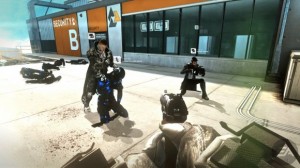 Overall Syndicate is a game that’s always competent, often enjoyable and occasionally a bit dull. While there are some great set pieces, including a fight against flying jet cycles on the back of a moving monorail, there are also very dull sections too. After a promising start the game takes you through some dull and bland sections, including a long and repetitive section in a lift shaft where none of the games stunning vistas of gleaming futuristic cityscapes can impress you. Compare that to a later section on a flying city above a tumultuous sea and you have one of the most original and gorgeous settings for an FPS seen this year. Its certainly a million miles away from another desert-based military shooter.
Overall Syndicate is a game that’s always competent, often enjoyable and occasionally a bit dull. While there are some great set pieces, including a fight against flying jet cycles on the back of a moving monorail, there are also very dull sections too. After a promising start the game takes you through some dull and bland sections, including a long and repetitive section in a lift shaft where none of the games stunning vistas of gleaming futuristic cityscapes can impress you. Compare that to a later section on a flying city above a tumultuous sea and you have one of the most original and gorgeous settings for an FPS seen this year. Its certainly a million miles away from another desert-based military shooter.
The story is a mix of good and bad too. While the atmosphere and tone is pitch perfect, there’s some problematic morality going on. An early section see’s your teammate massacre a train full of frightened civilians with bullets to the head while you accompany him. This leaves you to wonder if you are a hero, an anti-hero or just an asshole. Even later when you face some corporations who are doing terrible things, its not clear whether you are fighting them for moral reasons or just because they are trying to kill you. Your silent avatar offers no clue as to what the answer might be either.
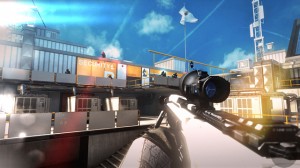 When Syndicate first starts it shows you a rather sparse title screen with few options and little visual flare. It feels light; stripped back and streamlined but a little unambitious. The game that follows is similar in many ways. Its got a strong aesthetic, but it feels a little anaemic and light. Its also overshadowed in most ways by the superior Deus Ex: Human Revolution. That being said, if you’re looking for even more cyber punk-ing, and you like your bleak corporate futures with less sneaking and more action, Syndicate remains a solid and enjoyable experience throughout.
When Syndicate first starts it shows you a rather sparse title screen with few options and little visual flare. It feels light; stripped back and streamlined but a little unambitious. The game that follows is similar in many ways. Its got a strong aesthetic, but it feels a little anaemic and light. Its also overshadowed in most ways by the superior Deus Ex: Human Revolution. That being said, if you’re looking for even more cyber punk-ing, and you like your bleak corporate futures with less sneaking and more action, Syndicate remains a solid and enjoyable experience throughout.
7 Matrix’s in the shell-omancer’s out of 10